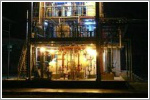
LEGAL STATEMENTS | EN | RU
HCL SYNTHESIS PLANTS
Hydrogen Chloride is used to produce hydrochloric acid, which is a key compound in the following industries: chlor-alkali, vinyl chloride monomer for PVC plastics, pulp & paper, epichlorohydrin, etc. and has smaller scale applications in metallurgical processes, gelatine and food products, etc.
Hydrogen Chloride is economically and reliably produced by burning chlorine with hydrogen, this is why HCl synthesis plants are commonly called chlorine burners.
VICHEM's units for HCl synthesis are designed on a three-in-one basis, including in only one unit the HCl gas synthesis, the cooling and the absorption process. This provides the following advantages:
- Simplified manufacture process flow, reduced operation staff and easy to handle
- Compact design for a small footprint
- Lower impurity content in the produced acid
- Longer lifetime
The unit consists of a burner, combustion chamber, an immersion cooling unit, falling film type absorber. We have chosen an immersion cooling system because it provides a number of benefits:
- good operation environment
- no vaporization spray
- safe and reliable operation
- no danger of burning-out during operation in case of power shutdowns
- wide range of possible capacities
- saving of water resources
- recovery of heat energy
Our design provides our clients with a number of flexible options:
- Hydrochloric acid concentration can reach up to 38%, and the absorbing liquid can be either water or weak hydrochloric acid
- Anhydrous HCl gas can be also produced
- We can design outlet HCl gas pressure according to our client's requirements; we can offer micro negative pressure till high pressure
- We can add a boiler system to benefit from the HCl synthesis heat, and hence produce steam

